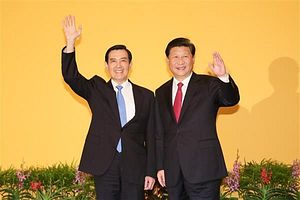Well before Taiwan held its elections on January 20, Beijing made it clear that the “1992 consensus” was its bottom line for cross-strait relations. During an historic meeting with then-President Ma Ying-jeou of Taiwan, Chinese President Xi Jinping stressed that “as long as the 1992 Consensus and its core values are acknowledged, we stand ready to have contact.” The implied threat: if then-presidential favorite (and now president) Tsai Ing-wen and her Democratic Progressive Party declined to embrace the 1992 Consensus, such “contact” might end.
Seven months, one election, and one presidential inauguration later, Beijing has made good on its threat. On Saturday, the Taiwan Affairs Office said in a statement that communication mechanisms between the two sides had been “suspended” since Tsai assumed office.
The 1992 Consensus refers to an agreement between the Communist Party of China (CPC) and the Kuomintang (KMT), Taiwan’s former ruling party. According to the consensus, the two sides agree that there is only one China, uniting both sides of the Taiwan strait – but with enough ambiguity so that each government (the People’s Republic of China in Beijing and the Republic of China in Taipei) could frame themselves as “China.”
The DPP, however, has never been interested in that formula. Tsai, throughout her campaign, resisted strong pressure from Beijing to endorse the 1992 Consensus. Though she frequently acknowledge the “historical fact” of the “1992 talks between the two institutions representing each side across the Strait,” Tsai’s main takeaway from the 1992 meetings is that “there was joint acknowledgement of setting aside differences to seek common ground.”
In her inaugural address on May 20, she proposed to carry on cross-strait relations based on the “existing political foundations”: the 1992 talks (but, importantly, not the consensus itself), “the existing Republic of China constitutional order,” the accumulated outcomes of previous cross-strait “negotiations and interactions,” and the “will of the people of Taiwan.”
That wasn’t good enough for Beijing. The TAO called her speech “an incomplete test answer,” saying, “She did not explicitly recognize the 1992 Consensus and its core implications.”
The TAO also repeated its core threat of severing cross-strait exchanges:
Both the mechanism of contact and communication between the Taiwan Affairs Office of the State Council and the Mainland Affairs Council of Taiwan and the mechanism of ARATS and SEF are based on the political foundation of the 1992 Consensus. Only affirmation of the political foundation that embodies the one China principle can ensure continued and institutionalized exchanges between the two sides of the Taiwan Straits.
On June 25, over a month later, TAO spokesperson An Fengshan confirmed that those “institutionalized exchanges” were on ice. “After May 20, because the Taiwan side still is not able to confirm the ‘1992 Consensus,’ the common political foundation that embodies the one China principle, cross-strait communication mechanisms have already been suspended,” An said.
The timing – a month and change after TAO complained about Tsai’s “incomplete test answer” – is interesting. In fact, instead of making a grand announcement about the severing of ties, the TAO slid that information into a question on an entirely different subject: the case Taiwanese citizens, suspected of telecommunications fraud, who were deported by Cambodia to mainland China for prosecution. That was just the latest in a string of deportations of Taiwanese from third countries – Kenya and Malaysia as well as Cambodia – to China at Beijing’s behest (for more, see Michael Turton’s analysis of the Kenya case for The Diplomat). The deportations first made headlines in the final stretch of Ma Ying-jeou’s presidency; since May 20, the Tsai administration has taken over discussing the cases with Beijing.
Or so it was assumed. An was explicitly responding to reports that the Tsai administration had registered a protest about the Cambodia deportations through “cross-strait channels.” His response, in effect, was to say that no such communication channels exist – at least not until the Tsai administration endorses the 1992 Consensus. It’s also noteworthy that this particular announcement comes as Tsai is on her inaugural trip abroad (to Paraguay and Panama, with transits via the U.S. cities of Miami and Los Angeles).
Beijing’s announcement, obviously, did not go over well in Taiwan. DPP caucus leader Wu Ping-jui accused Beijing of “blackmailing and coercing” Taiwan over the 1992 Consensus. According to CNA, Wu said that Taiwanese voters rejected the consensus by electing Tsai, and Beijing’s demands will only “toughen up Taiwanese determination.”
As of this writing, neither Tsai’s office nor the Mainland Affairs Council in Taiwan had commented on An’s statement.
Suspending official cross-strait communication mechanisms sets the relationship back nearly a decade – yet in a real sense, there’s no turning back the clock. Cross-strait business partnerships are booming (and, unfortunately, so are cross-strait criminal organizations). A lack of cross-strait dialogue mechanisms was dangerous back in the early 2000s, when there weren’t even direct flights between the two sides. Today, when economic, educational, and people-to-people ties are booming, it’s potentially catastrophic. Beijing’s move leaves no outlet for discussing sensitive issues that may arise (the recent deportations, for one).
It’s hard to fathom what Beijing’s end game is. Give Taiwan the silent treatment until Tsai’s term is up, and hope for a quick return to power by the KMT? If so, Beijing will have a long wait — at least four years, possibly eight (unless KMT can quickly overcome its worst electoral drubbing ever and internal political squabbling). In the meantime, without any dialogue mechanisms, there could be more damage done to cross-strait relations than either side can fix.































